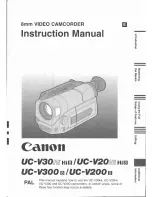
63
Using the Menu
HVR-A1U/A1N 2-639-667-13(1)
• The time code and user bits cannot be displayed
properly if the tape does not have time code
and/or user bits recordings or if the time code
was recorded using a non-compatible method.
• When you input HDV format signal via i.LINK
connection, the user-bits of the input video are
written on this camera, however, they are not
displayed during dubbing.
TC FORMAT
You can set up the recording mode for the
time code.
AUTO
Select the mode automatically in
accordance with the inserted cassette.
DF
Select the drop frame mode.
NDF
Select the non-drop frame mode.
• If you record onto a new cassette with the
camcorder in [AUTO] (the default setting), the
recorded time code is [NDF].
• If [TC MAKE] is set to [PRESET] with the
camcorder in [AUTO] (the default setting), the
recorded time code is [NDF] regardless of the
previously recorded method.
TC RUN
You can set how the time code advances
mode.
REC RUN
Advance the time code value only while
recording. Select this when making the
time code continuous at backspace editing.
FREE RUN
Advance the time code freely regardless of
the camcorder’s current operation mode.
The time code starts running once this setting
is selected.
TC MAKE
REGENERATE
Make the time code continuous at
backspace editing. Regardless of the
[TC RUN] setting, the running mode is
automatically set to [REC RUN].
PRESET
You do not want to make the time code
continuous at backspace editing.
UB TIME REC
OFF
You do not want to set the user bits to the
real time clock.
ON
Set the user bits to the real time clock.
Drop frame mode
In the NTSC standard, the time code value is
based on 30 frames per second, but the exact
video frame frequency is in fact 29.97 frames
per second. Consequently the time code value
will deviate from the real time when recording
for long time. Drop frame mode corrects for this
by skipping 2 frame counts at the beginning of
every minute which is not a multiple of 10. In
non-drop frame mode, however, no frame counts
are omitted, and there is a gradual deviation of
the time code from the real time.
• If you start recording when there is no video
input signal via an i.LINK connection, the time
code may not proceed correctly.
• If you record HDV and DVCAM (DV)
mixed, the time code may be initialized at the
backspace editing.
• If you play back the tape recorded in HDV and
DVCAM (DV) mixed, the time code may not
match the picture at the backspace editing.
• When recording in the HDV format,
discrepancy of 3 frames at the maximum may
occur.
• User-bit values appear at every 3 frames for the
tape recorded in the HDV format.
• When you input HDV format signal via i.LINK
connection, the user-bits are copied, however,
they are not regenerated.
MARKER SET
You can select the type of marker to be
displayed on the screen. Select whether
each type is displayed or not by selecting
[ON] or [OFF]. You can display more than
one type of marker at the same time.
• The marker display does not affect recording in
any way.
Continued
















































